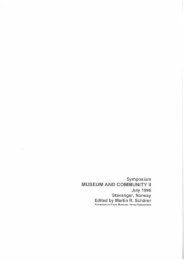Key Concepts of Museology - ICOM
Key Concepts of Museology - ICOM
Key Concepts of Museology - ICOM
You also want an ePaper? Increase the reach of your titles
YUMPU automatically turns print PDFs into web optimized ePapers that Google loves.
distinction is essential because <strong>of</strong> its<br />
consequences for museums, since<br />
the museum is an institution, that is<br />
to say a phenomenon which exists by<br />
common agreement and which can<br />
be altered.<br />
Within the museum, ethics can<br />
be defi ned as the discussion process<br />
aimed at identifying the basic values<br />
and principles on which the work <strong>of</strong><br />
the museum relies. Ethics lead to the<br />
drawing up <strong>of</strong> principles set out in<br />
museums’ codes <strong>of</strong> ethics, <strong>of</strong> which<br />
the <strong>ICOM</strong> code is one example.<br />
1. Ethics are aimed at guiding a<br />
museum’s conduct. In a moral vision<br />
<strong>of</strong> the world, reality is subject to a<br />
moral order which determines the<br />
place occupied by each person. This<br />
order constitutes a perfection towards<br />
which each being must strive by fulfi<br />
lling his function perfectly, and this<br />
is known as virtue (Plato, Cicero,<br />
etc.). By contrast, the ethical vision <strong>of</strong><br />
the world is based on a chaotic and<br />
disorganised world, left to chance<br />
and without any fi xed bearings.<br />
Faced with this universal disorder,<br />
individuals are the only judge <strong>of</strong> what<br />
is best for them (Nietzsche, Deleuze);<br />
they alone must decide for themselves<br />
what is good or bad. Between<br />
these two radical positions that are<br />
moral order and ethical disorder, a<br />
middle road is conceivable in so far<br />
as it is possible for people to agree<br />
freely among themselves to recognise<br />
common values (such as the principle<br />
<strong>of</strong> respect for human beings). Again<br />
this is an ethical point <strong>of</strong> view which<br />
on the whole governs the way modern<br />
democracies determine values. This<br />
fundamental distinction still infl uences<br />
the division between two types<br />
<strong>of</strong> museums or two ways <strong>of</strong> operating<br />
even today. Some very traditional<br />
museums such as fi ne arts museums<br />
seem to follow a pre-established<br />
order: their collections appear to<br />
be sacred and defi ne a model <strong>of</strong><br />
conduct by different actors (curators<br />
and visitors), and a crusading spirit<br />
in the way they carry out their tasks.<br />
On the other hand, some museums,<br />
perhaps more attentive to the practical<br />
reality <strong>of</strong> people’s lives, do not<br />
consider themselves subject to absolute<br />
values and continuously reassess<br />
them. These may be museums<br />
more in touch with real life, such<br />
as anthropology museums, striving<br />
to grasp an ethnic reality which is<br />
<strong>of</strong>ten fl uctuating, or so-called “social<br />
museums” for which questions and<br />
practical choices (political or social)<br />
are more important than the religion<br />
<strong>of</strong> collections.<br />
2. While the distinction between<br />
ethical and moral is quite clear in<br />
French and Spanish, the term in<br />
English is more open to confusion<br />
(éthique in French can be translated<br />
as ethic or also as moral in<br />
English). Thus the English version<br />
<strong>of</strong> the <strong>ICOM</strong> Code <strong>of</strong> Ethics (2006)<br />
in appears in French as Code de<br />
déontologie (Código de deontología<br />
in Spanish). The vision expressed in<br />
the code is, however clearly prescriptive<br />
and normative (and very similar<br />
to that expressed in the codes <strong>of</strong> the<br />
UK Museums Association and the<br />
33
















